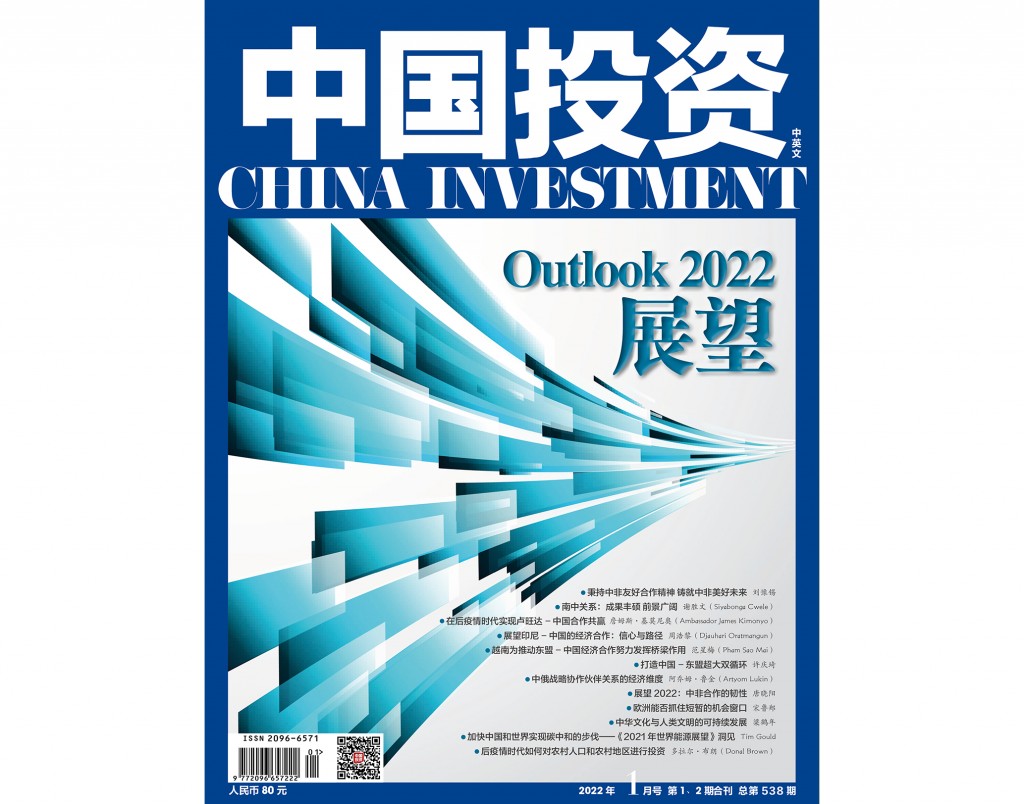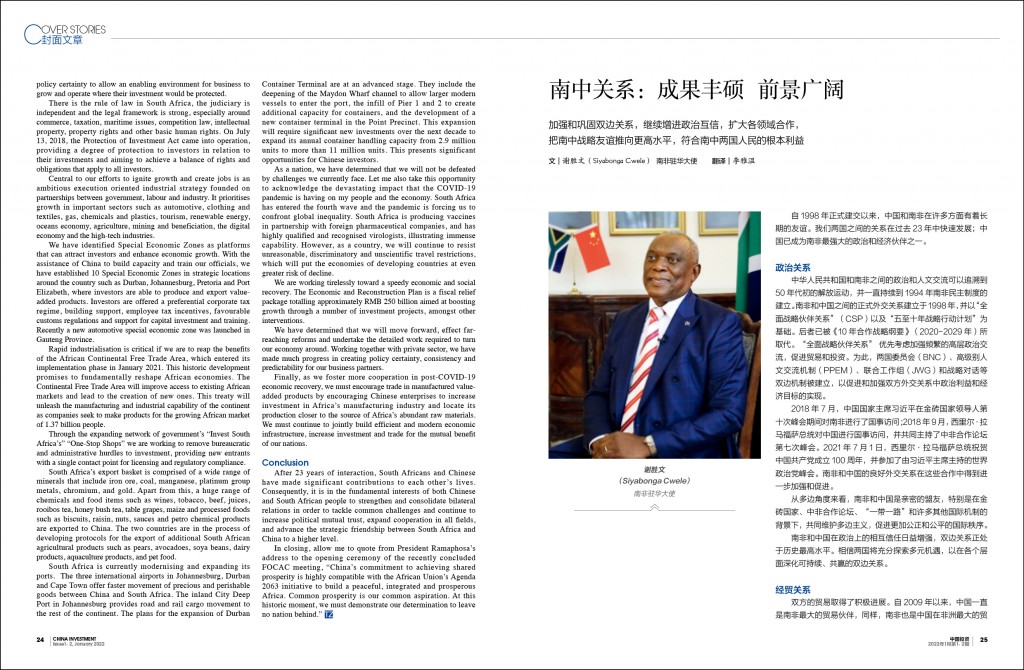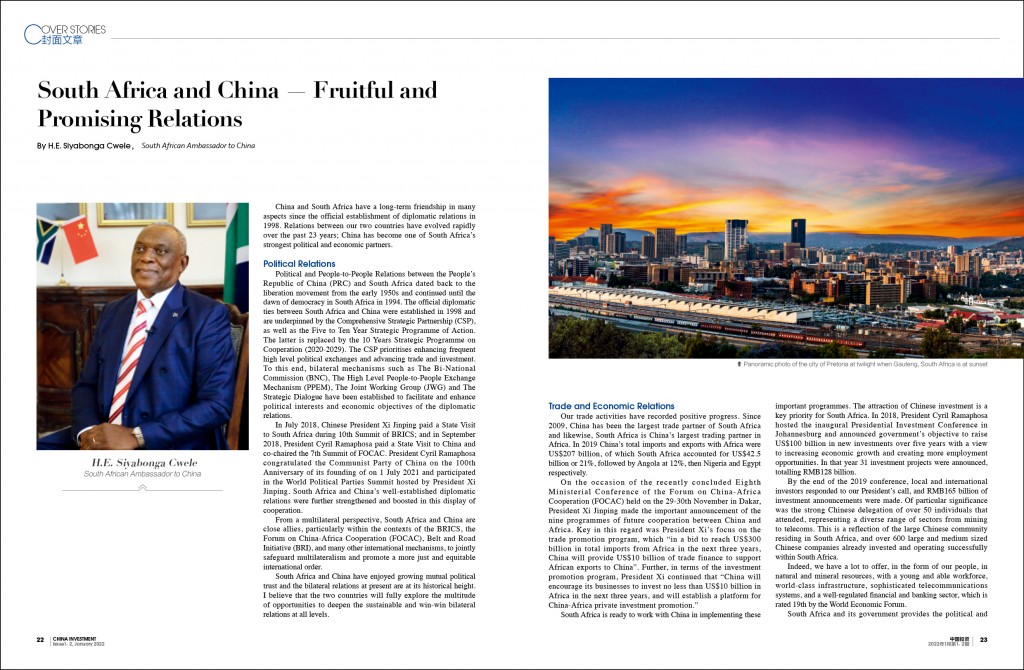
1月封面文章
2022展望
By H.E. Siyabonga Cwele, South African Ambassador to China
文|谢胜文(Siyabonga Cwele) 南非驻华大使
导读
●政治关系
●经贸关系
South Africa and China — Fruitful and Promising Relations
China and South Africa have a long-term friendship in many aspects since the official establishment of diplomatic relations in 1998. Relations between our two countries have evolved rapidly over the past 23 years; China has become one of South Africa’s strongest political and economic partners.
⬆ Panoramic photo of the city of Pretoria at twilight when Gauteng, South Africa is at sunset
Political and People-to-People Relations between the People’s Republic of China (PRC) and South Africa dated back to the liberation movement from the early 1950s and continued until the dawn of democracy in South Africa in 1994. The official diplomatic ties between South Africa and China were established in 1998 and are underpinned by the Comprehensive Strategic Partnership (CSP), as well as the Five to Ten Year Strategic Programme of Action. The latter is replaced by the 10 Years Strategic Programme on Cooperation (2020-2029). The CSP prioritises enhancing frequent high level political exchanges and advancing trade and investment. To this end, bilateral mechanisms such as The Bi-National Commission (BNC), The High Level People-to-People Exchange Mechanism (PPEM), The Joint Working Group (JWG) and The Strategic Dialogue have been established to facilitate and enhance political interests and economic objectives of the diplomatic relations.
In July 2018, Chinese President Xi Jinping paid a State Visit to South Africa during 10th Summit of BRICS; and in September 2018, President Cyril Ramaphosa paid a State Visit to China and co-chaired the 7th Summit of FOCAC. President Cyril Ramaphosa congratulated the Communist Party of China on the 100th Anniversary of its founding of on 1 July 2021 and participated in the World Political Parties Summit hosted by President Xi Jinping. South Africa and China’s well-established diplomatic relations were further strengthened and boosted in this display of cooperation.
From a multilateral perspective, South Africa and China are close allies, particularly within the contexts of the BRICS, the Forum on China-Africa Cooperation (FOCAC), Belt and Road Initiative (BRI), and many other international mechanisms, to jointly safeguard multilateralism and promote a more just and equitable international order.
South Africa and China have enjoyed growing mutual political trust and the bilateral relations at present are at its historical height. I believe that the two countries will fully explore the multitude of opportunities to deepen the sustainable and win-win bilateral relations at all levels.
Trade and Economic Relations
Our trade activities have recorded positive progress. Since 2009, China has been the largest trade partner of South Africa and likewise, South Africa is China’s largest trading partner in Africa. In 2019 China’s total imports and exports with Africa were US$207 billion, of which South Africa accounted for US$42.5 billion or 21%, followed by Angola at 12%, then Nigeria and Egypt respectively.
On the occasion of the recently concluded Eighth Ministerial Conference of the Forum on China-Africa Cooperation (FOCAC) held on the 29-30th November in Dakar, President Xi Jinping made the important announcement of the nine programmes of future cooperation between China and Africa. Key in this regard was President Xi’s focus on the trade promotion program, which “in a bid to reach US$300 billion in total imports from Africa in the next three years, China will provide US$10 billion of trade finance to support African exports to China”. Further, in terms of the investment promotion program, President Xi continued that “China will encourage its businesses to invest no less than US$10 billion in Africa in the next three years, and will establish a platform for China-Africa private investment promotion.”
South Africa is ready to work with China in implementing these important programmes. The attraction of Chinese investment is a key priority for South Africa. In 2018, President Cyril Ramaphosa hosted the inaugural Presidential Investment Conference in Johannesburg and announced government’s objective to raise US$100 billion in new investments over five years with a view to increasing economic growth and creating more employment opportunities. In that year 31 investment projects were announced, totalling RMB128 billion.
By the end of the 2019 conference, local and international investors responded to our President’s call, and RMB165 billion of investment announcements were made. Of particular significance was the strong Chinese delegation of over 50 individuals that attended, representing a diverse range of sectors from mining to telecoms. This is a reflection of the large Chinese community residing in South Africa, and over 600 large and medium sized Chinese companies already invested and operating successfully within South Africa.
Indeed, we have a lot to offer, in the form of our people, in natural and mineral resources, with a young and able workforce, world-class infrastructure, sophisticated telecommunications systems, and a well-regulated financial and banking sector, which is rated 19th by the World Economic Forum.
South Africa and its government provides the political and policy certainty to allow an enabling environment for business to grow and operate where their investment would be protected.
There is the rule of law in South Africa, the judiciary is independent and the legal framework is strong, especially around commerce, taxation, maritime issues, competition law, intellectual property, property rights and other basic human rights. On July 13, 2018, the Protection of Investment Act came into operation, providing a degree of protection to investors in relation to their investments and aiming to achieve a balance of rights and obligations that apply to all investors.
Central to our efforts to ignite growth and create jobs is an ambitious execution oriented industrial strategy founded on partnerships between government, labour and industry. It prioritises growth in important sectors such as automotive, clothing and textiles, gas, chemicals and plastics, tourism, renewable energy, oceans economy, agriculture, mining and beneficiation, the digital economy and the high-tech industries.
We have identified Special Economic Zones as platforms that can attract investors and enhance economic growth. With the assistance of China to build capacity and train our officials, we have established 10 Special Economic Zones in strategic locations around the country such as Durban, Johannesburg, Pretoria and Port Elizabeth, where investors are able to produce and export value-added products. Investors are offered a preferential corporate tax regime, building support, employee tax incentives, favourable customs regulations and support for capital investment and training. Recently a new automotive special economic zone was launched in Gauteng Province.
Rapid industrialisation is critical if we are to reap the benefits of the African Continental Free Trade Area, which entered its implementation phase in January 2021. This historic development promises to fundamentally reshape African economies. The Continental Free Trade Area will improve access to existing African markets and lead to the creation of new ones. This treaty will unleash the manufacturing and industrial capability of the continent as companies seek to make products for the growing African market of 1.37 billion people.
Through the expanding network of government’s “Invest South Africa’s” “One-Stop Shops” we are working to remove bureaucratic and administrative hurdles to investment, providing new entrants with a single contact point for licensing and regulatory compliance.
South Africa’s export basket is comprised of a wide range of minerals that include iron ore, coal, manganese, platinum group metals, chromium, and gold. Apart from this, a huge range of chemicals and food items such as wines, tobacco, beef, juices, rooibos tea, honey bush tea, table grapes, maize and processed foods such as biscuits, raisin, nuts, sauces and petro chemical products are exported to China. The two countries are in the process of developing protocols for the export of additional South African agricultural products such as pears, avocadoes, soya beans, dairy products, aquaculture products, and pet food.
South Africa is currently modernising and expanding its ports. The three international airports in Johannesburg, Durban and Cape Town offer faster movement of precious and perishable goods between China and South Africa. The inland City Deep Port in Johannesburg provides road and rail cargo movement to the rest of the continent. The plans for the expansion of Durban Container Terminal are at an advanced stage. They include the deepening of the Maydon Wharf channel to allow larger modern vessels to enter the port, the infill of Pier 1 and 2 to create additional capacity for containers, and the development of a new container terminal in the Point Precinct. This expansion will require significant new investments over the next decade to expand its annual container handling capacity from 2.9 million units to more than 11 million units. This presents significant opportunities for Chinese investors.
As a nation, we have determined that we will not be defeated by challenges we currently face. Let me also take this opportunity to acknowledge the devastating impact that the COVID-19 pandemic is having on my people and the economy. South Africa has entered the fourth wave and the pandemic is forcing us to confront global inequality. South Africa is producing vaccines in partnership with foreign pharmaceutical companies, and has highly qualified and recognised virologists, illustrating immense capability. However, as a country, we will continue to resist unreasonable, discriminatory and unscientific travel restrictions, which will put the economies of developing countries at even greater risk of decline.
We are working tirelessly toward a speedy economic and social recovery. The Economic and Reconstruction Plan is a fiscal relief package totalling approximately RMB 250 billion aimed at boosting growth through a number of investment projects, amongst other interventions.
We have determined that we will move forward, effect far-reaching reforms and undertake the detailed work required to turn our economy around. Working together with private sector, we have made much progress in creating policy certainty, consistency and predictability for our business partners.
Finally, as we foster more cooperation in post-COVID-19 economic recovery, we must encourage trade in manufactured value-added products by encouraging Chinese enterprises to increase investment in Africa’s manufacturing industry and locate its production closer to the source of Africa’s abundant raw materials. We must continue to jointly build efficient and modern economic infrastructure, increase investment and trade for the mutual benefit of our nations.
Conclusion
After 23 years of interaction, South Africans and Chinese have made significant contributions to each other’s lives. Consequently, it is in the fundamental interests of both Chinese and South African people to strengthen and consolidate bilateral relations in order to tackle common challenges and continue to increase political mutual trust, expand cooperation in all fields, and advance the strategic friendship between South Africa and China to a higher level.
In closing, allow me to quote from President Ramaphosa’s address to the opening ceremony of the recently concluded FOCAC meeting, “China’s commitment to achieving shared prosperity is highly compatible with the African Union’s Agenda 2063 initiative to build a peaceful, integrated and prosperous Africa. Common prosperity is our common aspiration. At this historic moment, we must demonstrate our determination to leave no nation behind.”

自1998年正式建交以来,中国和南非在许多方面有着长期的友谊。我们两国之间的关系在过去23年中快速发展;中国已成为南非最强大的政治和经济伙伴之一。
⬆ 南非豪登日落时比勒陀利亚城市暮色的全景照片
政治关系
中华人民共和国和南非之间的政治和人文交流可以追溯到50年代初的解放运动,并一直持续到1994年南非民主制度的建立。南非和中国之间的正式外交关系建立于1998年,并以“全面战略伙伴关系”(CSP)以及“五至十年战略行动计划”为基础。后者已被《10年合作战略纲要》(2020-2029年)所取代。“全面战略伙伴关系” 优先考虑加强频繁的高层政治交流,促进贸易和投资。为此,两国委员会(BNC)、高级别人文交流机制(PPEM)、联合工作组(JWG)和战略对话等双边机制被建立,以促进和加强双方外交关系中政治利益和经济目标的实现。
2018年7月,中国国家主席习近平在金砖国家领导人第十次峰会期间对南非进行了国事访问;2018年9月,西里尔·拉马福萨总统对中国进行国事访问,并共同主持了中非合作论坛第七次峰会。2021年7月1日,西里尔·拉马福萨总统祝贺中国共产党成立100周年,并参加了由习近平主席主持的世界政治党峰会。南非和中国的良好外交关系在这些合作中得到进一步加强和促进。
从多边角度来看,南非和中国是亲密的盟友,特别是在金砖国家、中非合作论坛、“一带一路”和许多其他国际机制的背景下,共同维护多边主义,促进更加公正和公平的国际秩序。
南非和中国在政治上的相互信任日益增强,双边关系正处于历史最高水平。相信两国将充分探索多元机遇,以在各个层面深化可持续、共赢的双边关系。
经贸关系
双方的贸易取得了积极进展。自2009年以来,中国一直是南非最大的贸易伙伴,同样,南非也是中国在非洲最大的贸易伙伴。2019年中国对非进出口总额为2070亿美元,其中南非占425亿美元,占比21%,其次是安哥拉,为12%,然后是尼日利亚和埃及。
在2021年11月29日至30日在达喀尔举行的中非合作论坛第八届部长级会议上,习近平主席就中非未来合作的九项计划作了重要讲话。其中的关键,是习近平主席对贸易促进计划的重视,该计划提出,“为了在未来三年内从非洲进口总额达到3000亿美元,中国将提供100亿美元的贸易融资,以支持非洲对中国的出口”。此外,在投资促进计划方面,习主席继续表示,“中国将在未来三年内鼓励其企业在非洲投资不少于100亿美元,并将为促进中非私人投资建立平台。
南非愿同中方一道实施这些重要项目。吸引中国投资是南非的一个关键优先事项。2018年,总统西里尔·拉马福萨在约翰内斯堡主持了首届总统投资会议,并宣布了政府在五年内筹集1000亿美元新投资的目标,以期促进经济增长并创造更多就业机会。同年共公布了31个投资项目,总额达1,280亿元人民币。
截至2019年的总统投资会议闭幕时,本地和国际投资者响应总统的号召,发布了价值1650亿元人民币的投资公告。特别重要的是,由50多人组成的,阵容强大的中国代表团出席了会议,他们代表了从采矿业到电信业等各个领域。这表明南非已拥有一个大型华人社区,并且600多家大中型中国企业在南非成功投资运营。
从我们的人民、自然和矿产资源来看,我们确实有很多东西可以提供。我们拥有年轻能干的劳动力、世界一流的基础设施、先进的电信系统,以及受到良好监管的金融和银行业,该行业曾被世界经济论坛评为世界第19位。
南非及其政府提供了政治和政策确定性,为企业的发展和运营提供了有利的环境,其投资将受到保护。南非实行法治、司法独立,法律框架强大,特别是在商业、税收、海事问题、竞争法、知识产权、产权和其他基本人权方面。2018年7月13日,《投资保护法》开始实施,为投资者的投资提供了一定程度的保护,旨在实现适用于所有投资者的权利和义务的平衡。
我们促进增长和创造就业机会的努力,其核心是一项雄心勃勃的以执行为导向的工业战略,该战略建立在政府、劳工和产业界之间的伙伴关系之上。它优先考虑汽车、服装和纺织、天然气、化学品和塑料、旅游、可再生能源、海洋经济、农业、采矿和选矿、数字经济和高科技行业等重要领域的增长。
我们已将经济特区确定为可以吸引投资者和促进经济增长的平台。得益于中国协助能力建设,并培训我们的官员,我们在德班、约翰内斯堡、比勒陀利亚和伊丽莎白港等全国各战略要地建立了10个经济特区,投资者可以在那里生产和出口增值产品。我们为投资者提供优惠的公司税制度、建筑支持、职工税收优惠、有利的海关法规以及对资本投资和培训的支持。最近,豪登(Gauteng)省启动了一个新的汽车经济特区。
如果我们要从非洲大陆自由贸易区(2021年1月进入实施阶段)中获益,快速实现工业化至关重要。这一历史性发展有望从根本上重塑非洲经济。大陆自由贸易区将增加现有非洲市场的准入,并促进新市场的建立。随着企业谋求为13.7亿人口这一不断增长的非洲市场制造产品,该协定将释放非洲大陆的制造业和工业能力。
通过不断扩大由政府建立的“投资南非”“一站式服务”网络,我们正在努力消除阻碍投资的官僚主义和行政障碍,为新进入者取得许可和接受监管提供一站式的对接部门。
南非的出口产品中有种类广泛的矿产,包括铁矿石、煤、锰、铂族金属、铬和黄金。除此之外,大量的化学品和食品,如葡萄酒、烟草、牛肉、果汁、路易波士茶、蜜树茶、鲜食葡萄、玉米、加工食品(如饼干、葡萄干、坚果、调味酱)和石油化工产品出口到中国。两国正在制定出口其他南非农产品的协议,如梨、牛油果、大豆、乳制品、水产养殖产品和宠物食品。
南非目前正在对其港口进行现代化扩建。约翰斯堡、德班和开普敦的三个国际机场为贵重和易腐货物在中国和南非之间的运输提供了更快的速度。约翰内斯堡的内陆城市深港为非洲大陆的其他地区提供公路和铁路货物运输。德班集装箱码头的扩建计划已进入后期阶段。该扩建计划包括加深Maydon Wharf航道以允许更大的现代船只进入港口,扩大1号和2号码头以创造额外的集装箱容纳空间,以及在Point Precinct开发一个新的集装箱码头。这一扩张在未来十年内将需要进行大量新的投资,以将其年度集装箱装卸能力从290万个单位扩大到超过1100万个单位。这为中国投资者提供了重要的机会。
作为一个民族,我们已下定决心,绝不能被目前我们所面临的挑战打败。但我也要借此机会承认新冠病毒大流行病对我国人民和经济造成了极具破坏力的影响。南非已经进入“第四波”疫情,疫情迫使我们面对全球性不平等。南非正在与外国制药公司合作生产疫苗,并拥有高素质和得到普遍认可的病毒学家,这都表明了巨大的能力。然而,作为一个国家,我们将继续抵制不合理、歧视性和不科学的旅行限制,因为这些限制会让发展中国家经济体面临更大的衰退风险。
我们正在为迅速实现经济和社会复苏而不懈努力。《经济与重建规划》是一项总额约2500亿元人民币的财政救济计划,旨在通过一系列投资项目和其他干预措施促进经济增长。
我们已决心向前迈进,实施意义深远的改革,并开展细致工作以扭转经济形势。我们与私营部门合作,在为我们的商业合作伙伴创造政策确定性、一致性和可预测性方面取得了很大进展。
最后,随着我们在后疫情时代的经济复苏中推进更多合作,我们必须鼓励中国企业增加对非洲制造业的投资,使其生产选址更接近非洲丰富原材料的来源地,从而促进增值制成品贸易。为了两国的互利,我们必须继续共同建设高效和现代的经济基础设施,增加投资和贸易。
结论
经过23年的互动,南非人和中国人为彼此的生活做出了重大贡献。因此,加强和巩固双边关系,继续增进政治互信,扩大各领域合作,把南中战略友谊推向更高水平,符合南中两国人民的根本利益。
最后,请允许我引用拉马福萨总统在最近结束的中非合作论坛会议开幕式上的讲话,“中国关于实现共同繁荣的承诺与非洲联盟关于建设一个和平、一体化的繁荣非洲的《2063年议程》倡议高度一致。共同繁荣是我们的共同愿望。在这个历史性时刻,我们必须表明不让任何国家掉队的决心。”
编辑 | 李雅温
校对 | 闫建军
设计 | 大 米



